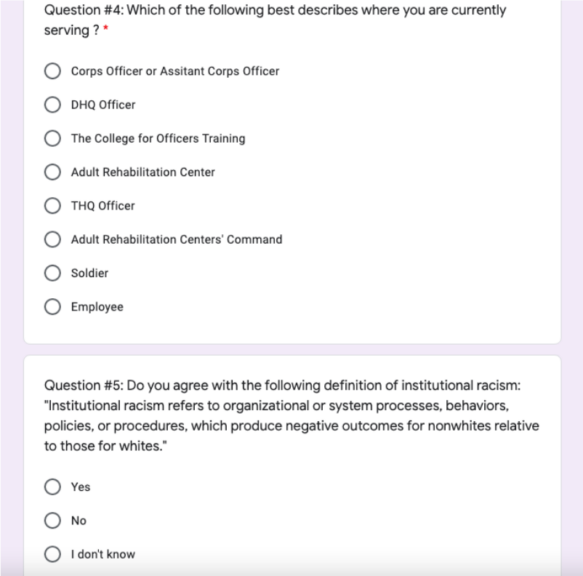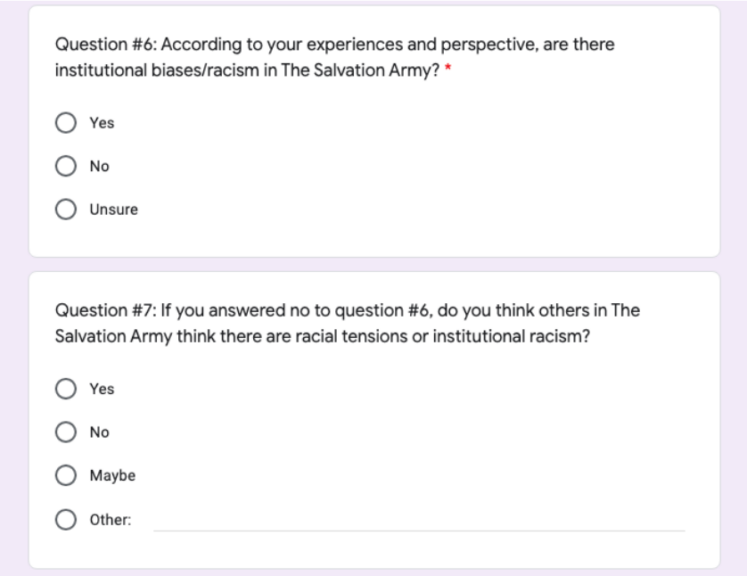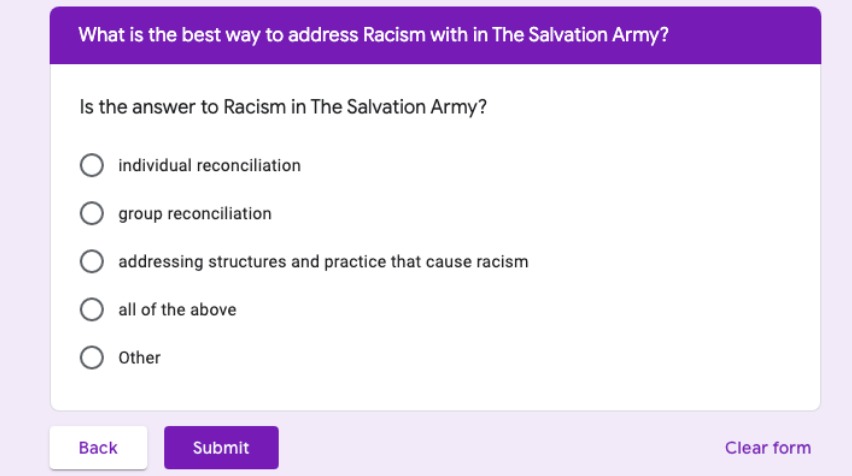Rotting from the head down.
Salvation Army's Internal Survey Suggests Only Whites Are Racist
One Salvation Army officer reached out on condition of anonymity to Color Us United, the raceblind advocacy organization which I run, to reveal an internal survey he was asked to take. It was not a voluntary survey, and was sent by the Territorial Diversity and Inclusion Secretary to every Salvation Army Officer in the US Central Territory. The purpose of the survey, according to an email from the "Territorial Racial Diversity and Inclusion Secretary," was "to better understand perception of institutional racial bias within The Salvation Army." The accompanying email stated that there was no "preconceived idea" with regard to whether or not racism existed in The Salvation Army, and told recipients that there were no wrong answers.
I sat down and went through the questions.
First, Questions #1, #2, and #3 asked me for my race, age, and gender. I could not skip these questions. Already, I felt uncomfortable being required to list my personal attributes. If I was an officer, I would be wondering: how could this information be used against me in the future? (They did promise anonymity in this survey.)
The survey then asks Salvationists if they agree with the following definition of racism: "Institutional racism refers to organizational or system processes, behaviors, policies, or procedures, which produce negative outcomes for nonwhites relative to those for whites." The remaining questions in the survey are dependent upon agreeing to this definition of racism. For any Officer or Soldier who disagrees with this framing, there is no way to express any disagreement or nuance apart from plainly saying that racism does not exist.
Going through the survey, it became apparent that the survey was attempting to lead me to making only one conclusion about The Salvation Army that it harbored problematic racism.
This belief is one of the core tenets of critical race theory. Critical race theorists teach that racism is ubiquitous in all aspects of American life. They also teach that it works systemically; that is, by being ingrained in the systems and institutions that operate in society. Their primary evidence of the system being racist is the reality that individuals from different demographics have different life outcomes on average, without taking into account any variables that might impact said life outcomes apart from the color of their skin. All of these concepts are reflected in The Salvation Army's survey.
Salvation Army's Internal Survey Suggests Only Whites Are Racist
One Salvation Army officer reached out on condition of anonymity to Color Us United, the raceblind advocacy organization which I run, to reveal an internal survey he was asked to take. It was not a voluntary survey, and was sent by the Territorial Diversity and Inclusion Secretary to every Salvation Army Officer in the US Central Territory. The purpose of the survey, according to an email from the "Territorial Racial Diversity and Inclusion Secretary," was "to better understand perception of institutional racial bias within The Salvation Army." The accompanying email stated that there was no "preconceived idea" with regard to whether or not racism existed in The Salvation Army, and told recipients that there were no wrong answers.
I sat down and went through the questions.
First, Questions #1, #2, and #3 asked me for my race, age, and gender. I could not skip these questions. Already, I felt uncomfortable being required to list my personal attributes. If I was an officer, I would be wondering: how could this information be used against me in the future? (They did promise anonymity in this survey.)
The survey then asks Salvationists if they agree with the following definition of racism: "Institutional racism refers to organizational or system processes, behaviors, policies, or procedures, which produce negative outcomes for nonwhites relative to those for whites." The remaining questions in the survey are dependent upon agreeing to this definition of racism. For any Officer or Soldier who disagrees with this framing, there is no way to express any disagreement or nuance apart from plainly saying that racism does not exist.
Going through the survey, it became apparent that the survey was attempting to lead me to making only one conclusion about The Salvation Army that it harbored problematic racism.
This belief is one of the core tenets of critical race theory. Critical race theorists teach that racism is ubiquitous in all aspects of American life. They also teach that it works systemically; that is, by being ingrained in the systems and institutions that operate in society. Their primary evidence of the system being racist is the reality that individuals from different demographics have different life outcomes on average, without taking into account any variables that might impact said life outcomes apart from the color of their skin. All of these concepts are reflected in The Salvation Army's survey.






